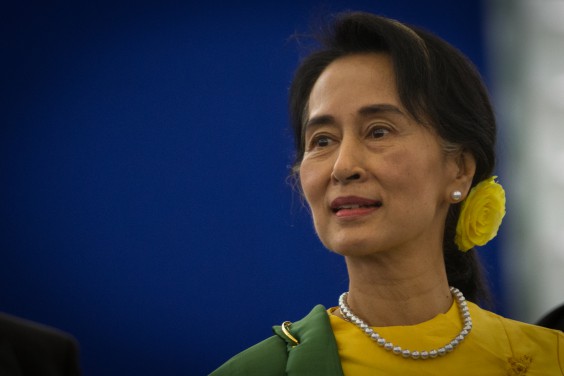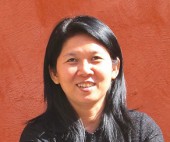Burma’s People Have Changed While the Government Has Yet to Reform
by Ma Thida / November 13, 2015 / No comments

Opposition leader Aung San Suu Kyi. Photo via Wikimedia
The military government’s “reforms” in Burma have yet to catch up to the wills of the people.
As the November 8, 2015 Burmese general election approached, the key opposition political party, the National League for Democracy (NLD), began using the phrase “It’s time to change” as its election slogan. Why did people think the country needed further change when it has already changed from military-rule to a constitution-based government?

- Literature is an echoing voice of people’s thought. Myanmar literature and media have suffered a lot along with people during five decades of censorship. The majority of Myanmar’s population are voiceless, and many untold stories are yet to be discovered by local or international writers and journalists. Here let’s try to find and listen to what problems people are feeling, thinking, and facing regarding freedom of expression in everyday lives in Myanmar.

- Ma Thida is a Burmese human rights activist, writer, medical doctor, and former prisoner of consciousness. In 1993, she was sentenced to twenty years in Burma’s Insein Prison for actively supporting the Nobel laureate Aung San Suu Kyi. She served six years of her sentence, largely in solitary confinement and was released through the efforts of Amnesty International and PEN International. She has published nine books in Burmese and English, including The Sunflower (1999), The Roadmap (2011), and Sanchaung, Insein, Harvard (2012), a memoir. Ma Thida is currently president of PEN Myanmar.
Though the military-backed government wanted to be seen as reformed, so-called reforms did nothing to change the deep problems in the community. The laws and their enforcement, the practices and attitudes of the government have yet to change — only people’s political awareness has changed. People are aware of their rights and practice making demands and arguing. That is the only measure of progress or change beyond the 2010 election.
People drew big lessons from the experience of the 1990 election. If the election results were not as the military authorities wished, any promises and pledges by either the government or electoral commission mean nothing — even manipulations and threats could be applied. Many incidences showed that this concept still held true as the day of the 2015 election drew ear.
Voter lists were at the very beginning of many concerning problems. Despite three rounds of revisions and more than five million corrections within the last five months (from May to September 2015), voter lists were still flawed. The Union Electoral Commission (UEC) was blamed for its political bias and mismanagement of its responsibilities, but it pointed to the lack of voter awareness. UEC Chairman U Tin Aye said, “Only 30 percent of eligible voters can be guaranteed the right to vote.” Citizens were mainly the ones responsible for checking their names on voter lists. In an exclusive interview with local media in February this year, Commander-in-Chief Min Aung Hlaing said “We have to be involved in the voting process under the system set up by the Election Commission. I’ve decided to undertake a pledge to be free and fair.’’ The UEC, however, prohibits political parties from criticizing both the state army and the 2008 Constitution. Of course, the UEC is formed mostly of either former or current military officials, and is led by a former military General who gave up his mandate just a day before he was assigned to become chairman.
Though the president’s Facebook page released a video about how the country had changed from one with a restricted media to one that’s open to freedom of expression, four people have recently been arrested and one more charged for their Facebook posts under the 2004 Electronic Transaction Act’s Article 34 D and 66 D. Chaw Sandi Tun at the Chit Thamee for her post comparing the new color of the army uniforms to that of Aung San Suu Kyi’s traditional women sarong; Partick Khum Jaa Lee for a photo thought to be insulting the army chief shared by others; Lu Zaw Soe Win for his photo of above; Than Tun, a local USDP office leader, for his post thought to be insulting Aung San Suu Kyi; and poet Maung Saung Kha being charged for his poem including a word “president.” There was much more evidence, like vinyl posters and electronic posts of images and texts obviously and frankly insulting Aung San Suu Kyi for her marriage to a foreigner. No other Facebook account users have ever been arrested or charged, and last year the wife of Minister of Information Ye Htut was not charged for posting altered photos of Aung San Suu Kyi wearing a hijab. The minister himself released a public apology on her behalf. Of course, many existing laws, like the 1923 National Secret Act, and the 2004 Electronic Transaction Act, are still used as weapons to beat citizens, including writers and journalists, as in the last military regime. Therefore the practice of the ruling USDP party, heir of the past military government, is crucial for the coming election, which will decide our country’s near future.
The exclusion of religious minorities in the candidate list was another weak point of this coming election. The UEC accepted hardly any Muslim candidate applications. Soon after an ultranationalist group had a big celebration of their successful establishment of a bill to protect race and religion, the NLD told the media that none of its candidates were Muslim. Since Aung San Suu Kyi and NLD were accused of being supporters of the Muslim religion, political analysts inside the country thought the NLD would not be accepted well in the Rakhine state. Moreover, Aung San Suu Kyi and NLD have almost no role in the current peace process. The NLD was thought to lose in the Kachin state, where current armed conflicts are going on. The Kachin Independent Armed force (KIA) did not sign the nationwide ceasefire agreement between the state army and seven ethnic armed forces. Religion and race have also been used as effective tools in election since the parliamentary democracy of the 1950s.
From September 8, 2015, when the campaign period began, the NLD was obviously given more attention and sympathy from the majority of the population. This threatened the ruling party, the army, and even the UEC. That’s why, on October 13, 2015, the UEC proposed postponing the November 8 election, saying heavy flooding in some areas in recent months would prevent it. This proposal was made to representatives from ten parties who were summoned to Naypyidaw, the capital. Only one of those representatives — of course from the NLD — disagreed, saying the floods were an insufficient reason for the postponement. Since people’s experience of failing to implement the parliament and the new government according to the 1990 election result, this action from the UEC was pretty much an alarm for another series of dirty manipulations either by the UEC or the government. However, later that day the state media announced that the historic election would continue as planned. Elections would still not be held in over 400 village areas, mostly in Kachin, Shan and Karen state, where there are armed conflicts.
How did people respond to this complex situation? Were they as naïve about their democratic rights and responsibilities as analysts thought? Had they changed their political practices?
The ruling party USDP mainly did their campaign talks by using T-shirts, food and daily allowance to convince locals. People usually took whatever the USDP gave them, but also showed up at NLD events and said that they might vote for the NLD candidates. These events unfolded in many places. Normally, the NLD attracted the largest crowds without giving them anything. The NLD also got strong support from famous singers and film stars who could bring more attraction from locals. However, people obviously stayed away even when the USDP used some young hip hop stars in their campaigns. People’s political awareness has changed compared to the 2010 election, when people were still afraid of openly supporting any political parties besides the USDP. Campaign strategy and the practice of the ruling USDP party have not changed since 2010, but what has changed is the people’s attitude toward the election campaigns.
Last week, Aung San Suu Kyi went to Taungok and Thandwe of Rakhine state, where there were many warnings of potential violence since locals had ripped up NLD candidates’ banners in Kyaukphyu. However, people from Rakhine state proved they are peaceful voters and enthusiastic followers of Aung San Suu Kyi. They lined up alongside the road, waving NLD flags. A similar series of events occurred in Kachin state before the Rakhine trip. Though local Kachin ethnic political parties said they did not want to allow Aung San Suu Kyi or the NLD to take all the seats in Kachin state, the people of Kachin state — especially Myitkyina — showed how much they were able to handle showing their support nonviolently. The peaceful gathering of thousands of locals where Aung San Suu Kyi and the NLD campaigned was strong proof of people’s understanding of their democratic rights and responsibilities.
Another example of people’s positive change could have been the advanced polls conducted in foreign countries. Though there are more than 3 million people in the Burmese diaspora — especially in Thailand, Malaysia and Indonesia — only around 30,000 are registered to vote in 37 countries. In Singapore, about 20,000 had registered to vote. Very long queues of voters in front of the Burmese embassy in Singapore made an interesting and attractive media story. As they stood in line, voters helped each other by donating necessary things like food and water, educating others on polling principles, doing post-poll surveys, and sharing their experiences about common problems via social media. Some voters who lost their chance to vote because of wrong voter lists or missing some ballot sheets filed their cases and wrote to the national UEC team via email. They also tried to have poll stations open on more days in order to give eligible voters more time to vote. These voters in Singapore truly reflect a change in people’s attitudes. Most thought that only at the grassroots level could people dare to show their desire to change. The educated middle-class population was somehow reluctant to show theirs in the past. Even in 2010, few voters abroad showed up to the polls. Now most voters in Singapore are well-educated and affluent people. They all now have shown their solidarity and integrity in taking on their responsibility as citizens to choose their government through exercising their right to vote.




